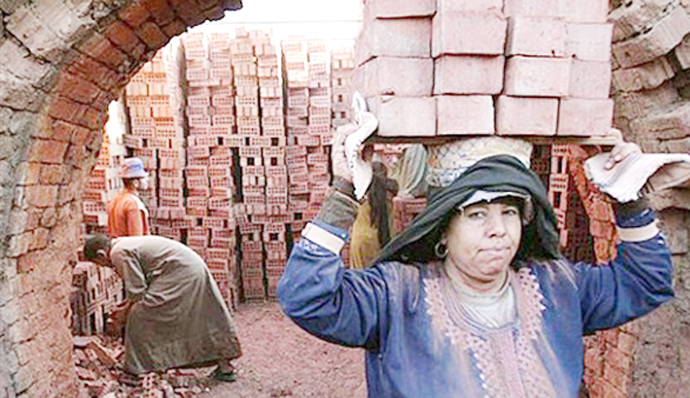By Amira Elhamy and Mona Alam El-din
Empowering women to participate fully in all business sectors is essential in building stronger economies and improving the quality of living for families and communities achieving the internationally agreed United Nations millennium Development Goals.
Although Inequalities still persist in some occupations and cultures, Women have succeeded in working environments around the World, Women’s participation in the labour force grew faster in the economy over the past three decades, the Economy experienced a reduction in poverty rates, women farmers lead an increase in crops production and women entrepreneurs have excelled in the world of business. We see today women as leaders, entrepreneurs and active employees who are effectively contributing Financially to their families, communities and countries.
In Egypt, several non-governmental institutions are dedicated to empower women economically and help them achieve their business goals; one of those institutions is AWTAD, The Association for Women’s Total Advancement and Development which is an NGO dedicated to professional and personal development of Egyptian women and youth as a mean to empower them on both the social and economic level. Recently, AWTAD organised an event named “ The Exchange of Experience”, which focused on presenting success stories of Egyptian and Arab women. Success stories included Egyptian women who were able to produce products that are 100% Egyptian made. The event also tackled several important key issues, related to experiences, funding and marketing challenges.
Most women who attended the lecture talked about the main challenges that they are facing them in Egypt; which are mainly funding and Marketing.
One of the successful women, who attended the event, is Mona Ahmed, an Egyptian woman who specializes in marketing hand made Egyptian products manufactured in Sinai. Mona Ahmed worked with almost 250 families in Sinai, however she informed MEO that the difficult economic conditions and the limited marketing outlets for her products are her main challenges. “I was working with 250 families in Sinai; I used to go to Sinai and work closely with those families; however, I have been facing many difficulties, which hindered me from working with a large number of families, hence I currently work with only 25 family. I have difficulties in being funded; banks give funds but with very high interest rates; there must be more institutions specialized in funding our projects,” said Mona Ahmed.
Another challenge that Mona Ahmed talked about is difficulty of marketing the Egyptian products. She explained that she faces difficulties nowadays accessing the international market; she notes that the government must exert more effort to link Egyptian manufacturers and producers (Specially SMEs) in reaching international markets. She adds that the decrease of tourists visiting Egypt has also affected her business.
Reham Abou El Einain, another successful entrepreneur in the field of fashion design (designs that are 100% Egyptian made) explained that Egyptian manufactures must be open to the international market, by being up to date with the international standards. “The Egyptian products, need to be promoted for the export market; I believe that social media nowadays plays a crucial role in linking us with the international market as it eases the process of following up with the latest fashion trends, however attending more international exhibitions might be an element which we need to target”, says Abou El Einain. Reham suggested establishing private institutions specialized in marketing Egyptian hand made products for markets abroad.
There is no doubt that similar institutions, like AWTAD must play an active role in developing the Egyptian economy; if the private sector and the government are to work together on finding solutions to those challenges, there is no doubt that marketing and funding of Egyptian producers, will witness a pick up on the short and long run..
UNDP
The National Council for Women (NCW) and the United Nations launched the “Taa Marbouta” campaign on Sunday October 2nd in a celebration held at the Cairo Opera House. The campaign aims to promote women’s social, political and economic empowerment in Egypt.
The celebration brought together current and former women ministers, policy makers, media, women rights advocates, different government and non-government stakeholders, UN agencies and NCW representatives as well as popular figures and celebrities.
“Taa Marbouta” refers to a component of the Arabic language that indicates the feminine conjugation in the Arabic language, and is associated with several powerful words in the Arabic language such as “culture,” “dignity” “power” and “willingness”. The slogan of the campaign is “Taa Marbouta is not your restriction, it is your strength”.
The TV spots were released during Ramadan earlier this year along with a social media campaign and reached 5 million Egyptians on the social media networks and 8 million through TV.
During the event a number of Egyptian women from different walks of life, including government officials, advocates against sexual harassment, women mechanics, and Olympic champions shared their success stories with the audience to advocate for women empowerment. They were honoured by the President of NCW Dr. Maya Morsy. The three heads of agencies supporting the campaign and Sweden were also recognised during the celebration.
“Taa Marbouta” campaign will be an important tool to help advocating for social, political and economic rights for women and promoting gender equality as one of the Sustainable Development Goals Egypt has committed itself to achieve by 2030.
Taa Marbouta” is funded by the Swedish International Development Agency (SIDA), with contribution from the UN agencies in Egypt, the United Nations Population Fund (UNFPA), the United Nations Development Programme (UNDP) and the United Nations Entity for Gender Equality and the Empowerment of Women (UN Women).
